Bridal and engagement jewellery is the backbone of the business for so many Australian retailers. Change is in the air, and jewellers must be prepared for what lies ahead.
After the doldrums of the COVID years and a gruelling post-pandemic economic recovery dominated by cost-of-living pressures and weakened consumer confidence, this coming year is expected to be highlighted by an influx of engagements and marriages.
According to the Australian Bureau of Statistics, while the national population has more than doubled since the 1970s, the number of marriages occurring each year has not changed significantly.
The number of marriages consistently fluctuated between 100,000 and 120,000 before the pandemic. There were 89,164 marriages in 2021, followed by a significant spike the following year, reaching 127,161, which indicates that ‘post-pandemic unions’ began to arrive.
Should this trend continue, this year is an important opportunity for budding young couples and jewellery retailers.
Easy Weddings, an events management company based in Victoria, publishes an annual report that includes survey responses from more than 4,000 engaged and newlywed couples. The report provides data on everything from budgets to demographics and supplier preferences.
The 2024 Australian Wedding Industry Report has forecasted 131,280 marriages in Australia this year, a subtle decline from the 134,370 marriages estimated to have occurred in 2023.
The report expects marriages to rise again in 2025, with 133,582 weddings expected to occur.
“We’ve seen the impact of cost-of-living pressures not only on everyday expenses but also a slight dip in overall wedding spending. The challenge of staying within a budget remains the number one source of stress for couples, prompting them to prioritise their non-negotiables and make budget-conscious decisions,” writes CEO Matt Butterworth.
“Despite these challenges, one thing is clear — love endures, and the wedding industry continues to be a source of hope and inspiration. Even as more Australian couples start their families before marriage, the value of matrimony and the dream of a grand wedding remain as strong as ever.
He added: “The average planning cycle remains consistent, but we’ve noted a steady increase in the average age of couples, suggesting longer engagement periods and more thoughtful, deliberate planning.”
This is not a phenomenon that is restricted to Australia. In the US, Signet Jewelers, the world’s largest retailer of diamond jewellery, has identified 2024 as a year that will bring an engagement and wedding ‘boom’.
Research from the retailer has suggested that because of the pandemic’s impact on dating, there was a ‘delay’ in the engagement process.
Signet suggests that couples date for an average of 3.25 years before engagement, making 2024 the year post-pandemic proposals are expected to surface.
CEO Virgina Drosos says that her company expects between 2.4 and 2.5 million engagements in the US this year. This is crucial for Signet as bridal jewellery accounts for approximately 50 per cent of sales.
“Why are we confident that engagements will recover? Our confidence is based on 45 proprietary milestones we track to measure a couple’s journey toward engagement,” she explains.
“Not every couple experiences all of the 45 milestones we track, but we know that once they reach 25 to 30 of these milestones, they become, statistically, significantly more likely to move on to engagement.”
So, what does this mean for your business? You’ll need to be prepared to take advantage of a possible spike in customers looking for engagement and bridal jewellery.
What do we know about the couples getting married? According to research from Easy Weddings, the average age of both bride and groom is rising. The average age of a bride in 2023 was 32, while for grooms, it was 35.
“In 2019, the average couple was a 28-year-old bride and 29-year-old groom,” the report states.
“While the marrying age of couples followed an upward trend for many years, contributed to by COVID postponements during 2020-2022, cost of living pressures have now impacted engagement lengths and extended marrying ages further as a result. A third of couples (33 per cent) are having a longer engagement due to budget concerns.”
Cost-of-living pressures have reduced budgets for 79 per cent of couples and have led to a change in approach towards ‘the big day’.
|
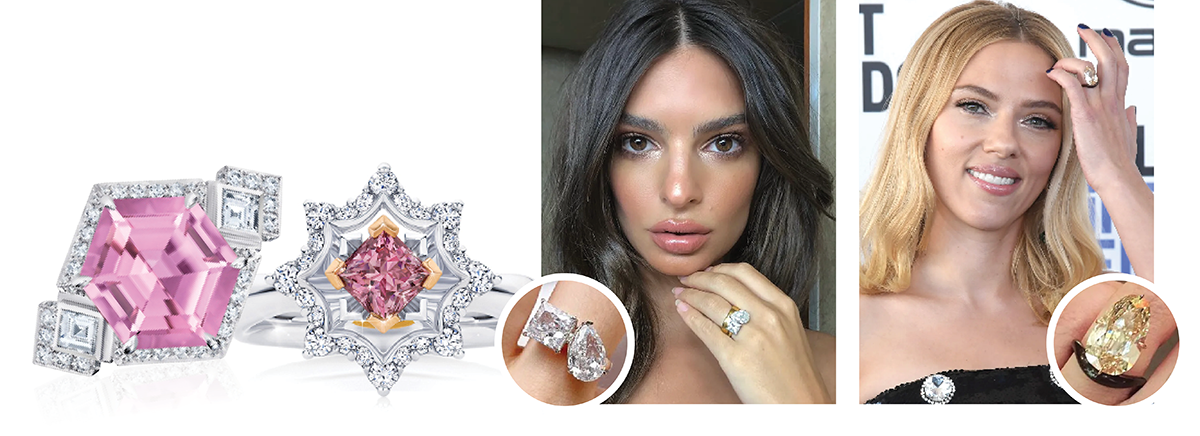 |
| L to R: Calleija, Emily Ratajowski, Scarlett Johansson |
|
Experimenting
Due to these budget constraints, couples are experimenting with cost-cutting measures and new ways to celebrate with friends and family that don’t break the bank.
Regarding jewellery, these pressures have been paired with another interesting phenomenon in style and fashion – the increasing desire for personalisation.
Younger consumers increasingly seek clothing and jewellery with a personalised touch, which suggests that the adornment is unique to them.
When paired with budget pressures, this thirst for personalisation is encouraging young couples to explore non-traditional engagement and bridal jewellery.
“While sentimental value can be imbued in a favourite pair of jeans, a signature scent, or a treasured knickknack unearthed at a thrift shop, there’s no denying that an engagement ring holds more emotional weight than any other item a person owns,” writes Shelby Wax of Vogue.
“Given as a promise of love, loyalty, and partnership, an engagement ring is a piece of jewellery often worn every single day to honour one’s commitment to a spouse or spouse-to-be. Since this investment piece might feel as much a part of you as the hair on your head, having a ring design that feels authentic to you and your style is absolutely essential.”
She adds: “That’s why creating a bespoke engagement ring is a must for many couples looking to tie the knot. Luckily, the process of going custom has become much simpler in the modern era.”
Jeweller surveyed more than 200 independent jewellery retailers in Australia as part of its research for the 2024 State of the Industry Report.
Retailers were asked if custom-made or bespoke jewellery has become increasingly important in their business in the past 5-10 years.
More than 76 per cent of responses either ‘strongly agreed’ or ‘agreed’ to that statement, suggesting that personalisation is more appealing than ever for Australian consumers.
Overwhelming options
When it comes to experimental engagement ring options, there are many options to consider for consumers and retailers.
• Emerald: With mesmerising green hues, emeralds are an enticing alternative to diamond jewellery. The best emerald is neither too deep nor too light in colour, striking a balanced intensity that is highly transparent.
In recent years, few engagement rings have been as heavily discussed online as that of US actress Megan Fox. Following her engagement to rapper Machine Gun Kelly, Fox showcased a ring with two interlocking bands held together by a magnet.
One band holds a pear-shaped diamond, while the other features a pear-shaped Colombian emerald, with both stones resting on an 18-carat white gold pavé set.
• Ruby: Rubies are a popular alternative to a traditional engagement ring because they’re both bold while maintaining an aura of sophistication and class.
Rubies come in a wide range of tones, from deep pink to dark red, and strike an impressive contrast against white and yellow precious metals.
Among the more iconic ruby engagement rings is that of US actress Eva Longoria, who married Mexican film producer José Bastón in 2016. Longoria’s engagement ring features an eight-carat ruby halo set with diamonds in a platinum band.
• Sapphire: Sapphire is a popular choice for engagement rings for various reasons. The gemstone comes in many colours and is one of the hardest alternative stones, which is ideal for everyday wear.
Sapphires are not only durable, but they’re also versatile. They mix well with other gemstones and diamonds and can be worn alone. They pair well with silver, gold, and platinum and can be featured in classic and contemporary designs.
In 2018, Princess Eugenie of York was engaged to boyfriend Jack Brooksbank, an English businessman. Princess Eugenie’s engagement ring features a rare padparadscha sapphire, displaying a unique pink-orange shade that highlights the wide range of colours the gemstone is capable of.
• Opal: Opal jewellery might be the right choice for consumers looking for an engagement ring with a more vintage or ‘heirloom’ feel.
With tightened discretionary spending in mind, opal rings are also a budget-friendly alternative for young couples amid the pressure of wedding expenses.
Most of the world’s gemstone-quality opal is sourced from Australia, an additional advantage for consumers hoping to purchase something ‘homegrown’.
Gossip columns and tabloid magazines in the US have been dominated by the relationship between singer Taylor Swift and NFL star Travis Kelce over the past year.
In December, speculation ignited about an opal ring the Kansas City Chiefs player had gifted the singer, suggesting that it was symbolic of a planned engagement.
• Morganite: Morganite is another gemstone that has grown in popularity over the past decade for consumers looking for an engagement ring that can withstand everyday wear.
Morganite is found in shades of orange and pink and is often paired with rose gold for a feminine look.
British actress Lily Collins was engaged to boyfriend Charlie McDowell in 2020, and the pair sealed the commitment with a three-carat cushion cut morganite stone set in a yellow gold band.
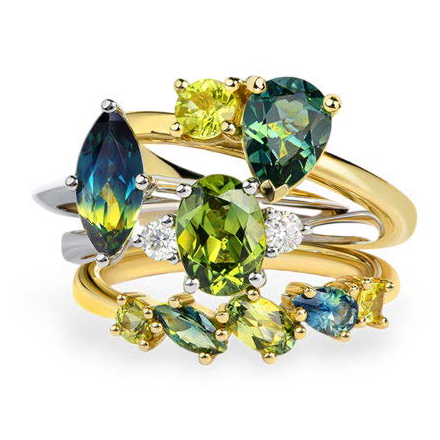 | 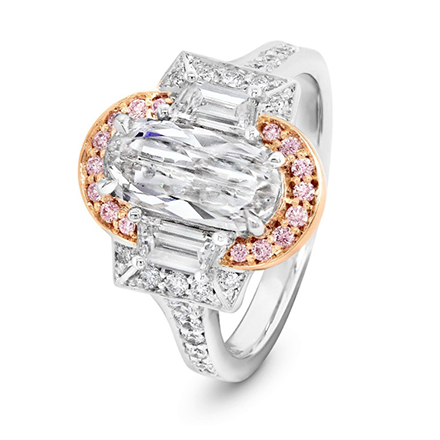 | 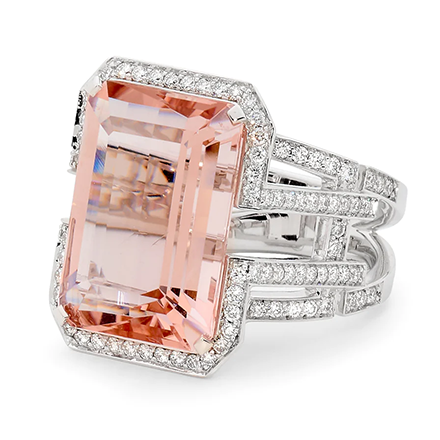 | 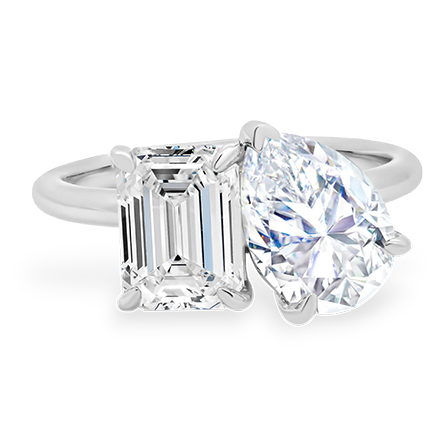 |
| Sapphire Dreams | Ellendale Diamonds | Linneys | Moi Moi |
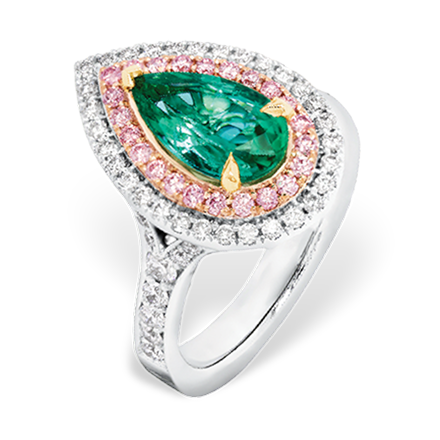 | 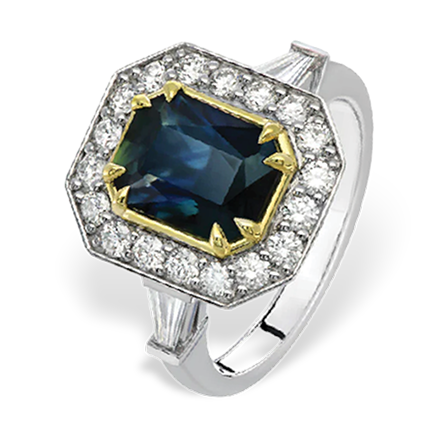 |  |  |
| Ellendale Diamonds | Sapphire Dreams | Soklich & Co. | Stuller |
Old faithful
While consumers have a wide variety of gemstones to choose from when selecting an engagement ring, diamonds still reign supreme as a symbol of luxury.
Whether it be because of the cultural dominance of diamonds over the past century or the innate beauty of the stone, consumers still overwhelmingly choose diamonds first when planning for an engagement or wedding.
That said, there’s always room for innovation, particularly in design. Reflecting on notable changes in jewellery design over the past decade, Katerina Perez says that young couples are more willing to experiment than ever.
“To really see experimentation, however, one needs to look to the most reserved of natural diamond categories: engagement rings,” she writes for the Natural Diamond Council.
“Typically, when a woman hopes to wear a piece of jewellery for the rest of her life, she chooses a more traditional path and a ‘safe’ design, such as a classic round brilliant-cut solitaire.
“However, over the last ten years, I’ve seen engagement rings that defy all expectations: fancy-cut diamonds, bezel settings rather than traditional claws, blackened 18-carat gold at Jessica McCormack, asymmetric styles, portrait-cut diamonds, bridal stacks, engagement ring jackets, I could go on.”
Perez also drew attention to fancy-cut and fancy-shape diamonds, such as carré, bullet cuts, briolettes, rose cuts, half-moons, trilliant, and kites.
These diamonds are no longer restricted to the work of elusive private jewellers. They appear in collections from some of the world’s biggest jewellery brands, such as Chopard and Chanel.
“Technologies are rapidly changing the cutting landscape, and soon, customers may be able to have any type of diamond they wish in whatever shape they demand,” she said.
“I believe we are entering a period of profound innovation and creativity – one that rips up the rule book and takes natural diamonds into a new and exciting era.”
|
 |
| L to R: Pink Kimberley Diamonds, Hailey Bieber, Musson |
|
Thinking outside the box
Preparing for an incoming wave of weddings and engagements doesn’t just mean focusing on offering alternative gemstones and designs.
There are many other ways retailers can meet and exceed consumers’ desires.
In November, Australian jewellery retailer Moi Moi – with stores in Melbourne and Sydney – announced the launch of the ‘Bridal Borrow’ program, signifying a shift in approach to wedding and engagement jewellery.
The program allows customers to reserve pieces from Moi Moi’s collection as a rental.
Customers who spend $10,000 in a single transaction, including the purchase of an engagement ring, are eligible for the program.
“I remember looking for jewellery for my own wedding and struggling to find beautiful pieces that aligned with both my budget and vision for the big day," explains founder Lauren Sommer.
"I was reluctant to invest a huge amount into jewellery when I had our wedding and other expenses to think of.
“As a family business, we feel privileged to be part of our clients’ special days. We believe that every milestone deserves to be celebrated in style, and this program empowers brides to do just that.”
Borrowed pieces are available to purchase from Moi Moi after the rental for an ‘exclusive’ price.
Fashion rental companies became increasingly popular during the pandemic, and the Bridal Borrow program is one example of retailers experimenting with new services to appeal to the next generation of consumers.
If modern consumers are increasingly thinking outside the box when it comes to jewellery, retailers must meet these needs by showcasing adaptability to the latest trends and designs to ensure that they have an important role to play in the most significant day of many people’s lives.
READ EMAG